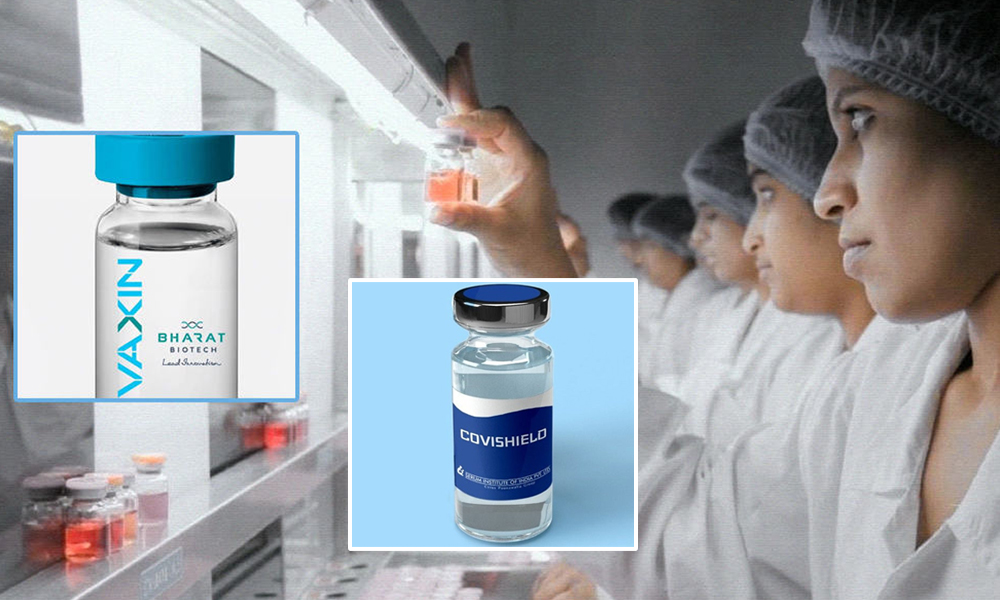
Image Credit: Telangana Today
Registration, Eligibility, Procedure: All You Need To Know About COVID-19 Vaccination Process
Writer: Rakshitha R
Rakshitha an engineer turned passionate journalist with an inclination for poetry, creative writing, movies, fiction, mountains and seclusion. Not a part of the social process but existential.
India, 4 Jan 2021 10:04 AM GMT
Editor : Shubhendu Deshmukh |
Shubhendu, the quint essential news junky, the man who loves science and politics in equal measure and offers the complete contrast to it by being a fan of urdu poetry as well.
Creatives : Abhishek M
" An engineer by profession, Abhishek is the creative producer of the team, graphic designing is his passion and travelling his get away. In more ways than one, he makes the content visually appealing."
Two doses of vaccine, 28 days apart are needed to be taken by a person to complete the vaccine schedule.
India has approved two made in India vaccines, Oxford-AstraZeneca's 'Covishield' and Bharat Biotech's 'Covaxin' for emergency use authorisation.
The Drugs Controller General of India (DCGI) granted approval for these vaccines on the basis of recommendations by a COVID-19 Subject Expert Committee (SEC) of the Central Drugs Standard Control Organisation (CDSCO).
'Covishield' is developed by the UK's University of Oxford and pharmaceutical giant AstraZeneca. Its efficiency is found to be around 70 per cent. In India, its trial was undertaken by Pune-based Serum Institute of India (SII) which is also manufacturing the vaccine for mass vaccination drive. Covaxin is still conducting Phase-3 trials.
With the country ready to roll out the vaccines, the government on Sunday tweeted a three-part video series to answer many common questions about the vaccine and the vaccination process.
All India Institute of Medical Sciences (AIIMS) director Dr Randeep Guleria gave a brief explanation on the entire process and clarified certain queries on the vaccination process.
Frequently Asked Questions
Efficacy of the two vaccines?
While Covaxin is still in the final stage of clinical trial and no efficacy rate has been made public for this COVID-19 vaccine, the efficiency of Covishield has been pegged at over 70 per cent. This efficacy is far below the vaccines developed by Pfizer-NBiotech and Moderna, but it is above the qualifying efficacy benchmark of 50 per cent set by many countries.
Out of many vaccines available, how is one or more chosen for administration?
The safety and efficacy data from the clinical trials are examined by the drug regulator before approving a vaccine. Hence, all the vaccines that receive the license will have to be safe and efficient.
But it is crucial to ensure that the entire vaccination schedule is completed with one type of vaccine as vaccines are not interchangeable.
Will the vaccine be administered to everyone simultaneously?
This will depend on the availability of the vaccines. The government has made a priority list of people who will get the vaccines first. They include healthcare and frontline workers. The second group will be people over the age of 50 and those under 50 with comorbid conditions.
Is it mandatory to take the vaccine?
No, taking the vaccine is voluntary. However, it is recommended to take the complete vaccine schedule as far as COVID-19 is concerned because we want to protect ourselves as well as others.
How many doses of the vaccine should one get? At what intervals?
Two doses of vaccine, 28 days apart are needed to be taken by a person to complete the vaccine schedule.
When will antibodies develop after vaccination?
Two weeks after receiving the second dose of COVID-19 vaccine.
What are the possible side effects?
Side effects may be in the form of mild fever, pain at the site of injection, body aches, etc. However, states have been asked to make arrangements to deal with any side-effects as one of the measures towards ensuring safe vaccine delivery.
How will anybody know that they are eligible for vaccination?
The eligible beneficiaries will be informed through their registered mobile number about where the vaccine will be provided and the scheduled time for the same.
Can one get the vaccine without registration?
No, that would not be right. The registration is mandatory and the information on the session site will be shared only after registration.
How should one register to get the vaccine?
The government has announced Co-Win app, a digital platform for real-time monitoring of vaccine. It will also enable people to get themselves registered for vaccination.
What are the documents required for the registration?
Driving license, Health Insurance Smart Card issued under the scheme of labour ministry, MGNREGA job card, official ID cards issued by MPs/MLAs/MLCs, PAN card, passbooks issued by banks/post office, passport, pension documents, service ID cards issued to employees by central/ state govt/ Public Ltd Companies or Voter ID cards, and a photo.
These are 'must' for both registration and verification of beneficiary at session site to ensure that the intended person is vaccinated.
Should a person presently having active and symptomatic infection be vaccinated?
People with active and symptomatic infection may increase the risk of spreading the same at vaccination sites. Those people with infection should postpone the vaccination for at least 14 days after the symptoms are resolved.
Should a COVID-19 recovered person receive the vaccine?
Yes, it is advisable to receive the complete schedule of vaccine irrespective of past history of infection with COVID-19. This will help you to develop a better immune response against the disease.
Should a person taking medicines for illnesses like cancer, diabetes, hypertension, etc take the vaccine?
Yes, it is important that such individuals take the vaccine because they're high-risk groups. Their medicines will not affect vaccine efficacy.
Also Read: No Plans To Enter "Corporate" Or "Contract" Farming: Reliance Industries
 All section
All section














